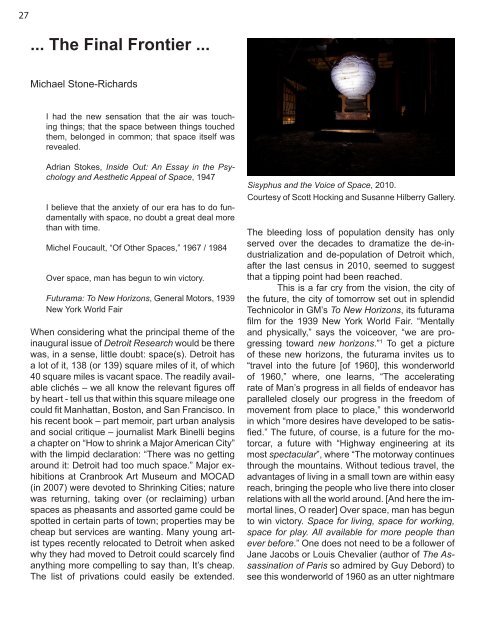Detroit Research Volume 1
You also want an ePaper? Increase the reach of your titles
YUMPU automatically turns print PDFs into web optimized ePapers that Google loves.
27<br />
... The Final Frontier ...<br />
Michael Stone-Richards<br />
I had the new sensation that the air was touching<br />
things; that the space between things touched<br />
them, belonged in common; that space itself was<br />
revealed.<br />
Adrian Stokes, Inside Out: An Essay in the Psychology<br />
and Aesthetic Appeal of Space, 1947<br />
I believe that the anxiety of our era has to do fundamentally<br />
with space, no doubt a great deal more<br />
than with time.<br />
Michel Foucault, “Of Other Spaces,” 1967 / 1984<br />
Over space, man has begun to win victory.<br />
Futurama: To New Horizons, General Motors, 1939<br />
New York World Fair<br />
When considering what the principal theme of the<br />
inaugural issue of <strong>Detroit</strong> <strong>Research</strong> would be there<br />
was, in a sense, little doubt: space(s). <strong>Detroit</strong> has<br />
a lot of it, 138 (or 139) square miles of it, of which<br />
40 square miles is vacant space. The readily available<br />
clichés – we all know the relevant figures off<br />
by heart - tell us that within this square mileage one<br />
could fit Manhattan, Boston, and San Francisco. In<br />
his recent book – part memoir, part urban analysis<br />
and social critique – journalist Mark Binelli begins<br />
a chapter on “How to shrink a Major American City”<br />
with the limpid declaration: “There was no getting<br />
around it: <strong>Detroit</strong> had too much space.” Major exhibitions<br />
at Cranbrook Art Museum and MOCAD<br />
(in 2007) were devoted to Shrinking Cities; nature<br />
was returning, taking over (or reclaiming) urban<br />
spaces as pheasants and assorted game could be<br />
spotted in certain parts of town; properties may be<br />
cheap but services are wanting. Many young artist<br />
types recently relocated to <strong>Detroit</strong> when asked<br />
why they had moved to <strong>Detroit</strong> could scarcely find<br />
anything more compelling to say than, It’s cheap.<br />
The list of privations could easily be extended.<br />
Sisyphus and the Voice of Space, 2010.<br />
Courtesy of Scott Hocking and Susanne Hilberry Gallery.<br />
The bleeding loss of population density has only<br />
served over the decades to dramatize the de-industrialization<br />
and de-population of <strong>Detroit</strong> which,<br />
after the last census in 2010, seemed to suggest<br />
that a tipping point had been reached.<br />
This is a far cry from the vision, the city of<br />
the future, the city of tomorrow set out in splendid<br />
Technicolor in GM’s To New Horizons, its futurama<br />
film for the 1939 New York World Fair. “Mentally<br />
and physically,” says the voiceover, “we are progressing<br />
toward new horizons.” 1 To get a picture<br />
of these new horizons, the futurama invites us to<br />
“travel into the future [of 1960], this wonderworld<br />
of 1960,” where, one learns, “The accelerating<br />
rate of Man’s progress in all fields of endeavor has<br />
paralleled closely our progress in the freedom of<br />
movement from place to place,” this wonderworld<br />
in which “more desires have developed to be satisfied.”<br />
The future, of course, is a future for the motorcar,<br />
a future with “Highway engineering at its<br />
most spectacular”, where “The motorway continues<br />
through the mountains. Without tedious travel, the<br />
advantages of living in a small town are within easy<br />
reach, bringing the people who live there into closer<br />
relations with all the world around. [And here the immortal<br />
lines, O reader] Over space, man has begun<br />
to win victory. Space for living, space for working,<br />
space for play. All available for more people than<br />
ever before.” One does not need to be a follower of<br />
Jane Jacobs or Louis Chevalier (author of The Assassination<br />
of Paris so admired by Guy Debord) to<br />
see this wonderworld of 1960 as an utter nightmare





